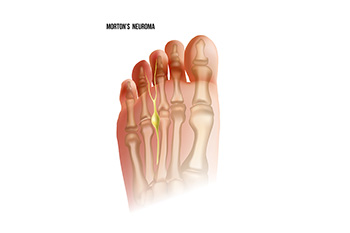
The pain from the foot condition which is known as Morton’s neuroma is felt in the ball of the foot. Patients notice the sensation can feel like a pebble is in the shoe or sock and can be uncomfortable. A common reason why Morton’s neuroma may develop can be from frequently wearing high heels. The small narrow toe box generally does not provide adequate room for the toes to move freely and can cause the nerve that lies between the third and fourth toes to become compressed and irritated. People who participate in sports such as tennis, running, and racquetball also may be prone to developing this condition. In severe cases, there may be a tingling or numbing sensation under the toes, and a burning feeling may radiate to the ball of the foot. An MRI may be suggested, and this is often helpful in ruling out an existing lesion. If you have symptoms of Morton’s neuroma, it is suggested that you contact a podiatrist as quickly as possible who can help you with relief and treatment methods.
Morton’s neuroma is a very uncomfortable condition to live with. If you think you have Morton’s neuroma, contact Kenneth Donovan, DPM of Advanced Care Foot and Ankle. Our doctor will attend to all of your foot care needs and answer any of your related questions.
Morton’s Neuroma
Morton's neuroma is a painful foot condition that commonly affects the areas between the second and third or third and fourth toe, although other areas of the foot are also susceptible. Morton’s neuroma is caused by an inflamed nerve in the foot that is being squeezed and aggravated by surrounding bones.
What Increases the Chances of Having Morton’s Neuroma?
- Ill-fitting high heels or shoes that add pressure to the toe or foot
- Jogging, running or any sport that involves constant impact to the foot
- Flat feet, bunions, and any other foot deformities
Morton’s neuroma is a very treatable condition. Orthotics and shoe inserts can often be used to alleviate the pain on the forefront of the feet. In more severe cases, corticosteroids can also be prescribed. In order to figure out the best treatment for your neuroma, it’s recommended to seek the care of a podiatrist who can diagnose your condition and provide different treatment options.
If you have any questions, please feel free to contact our office located in Charleston, SC . We offer the newest diagnostic and treatment technologies for all your foot care needs.
